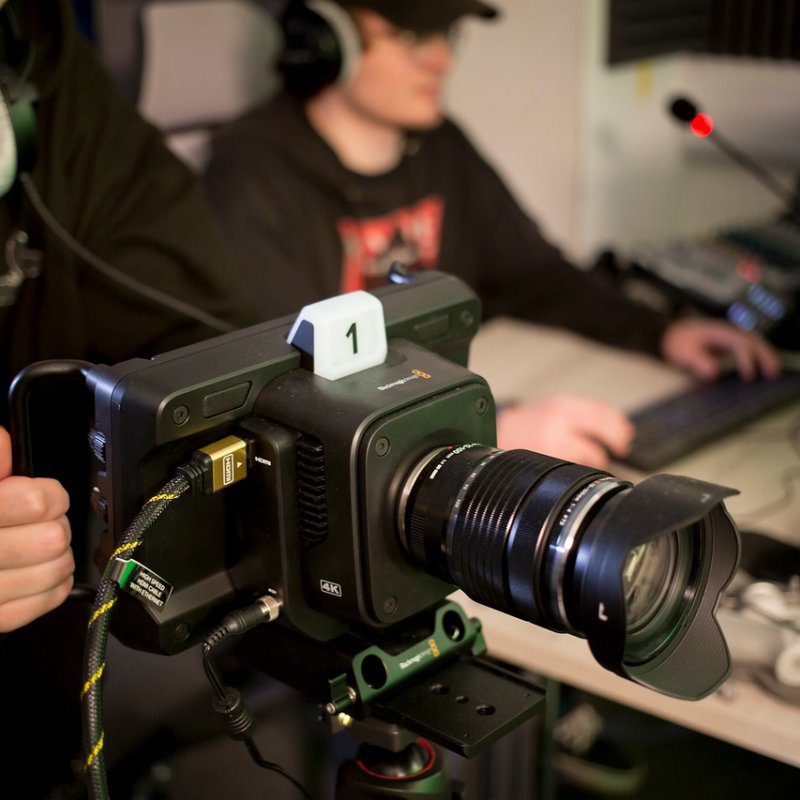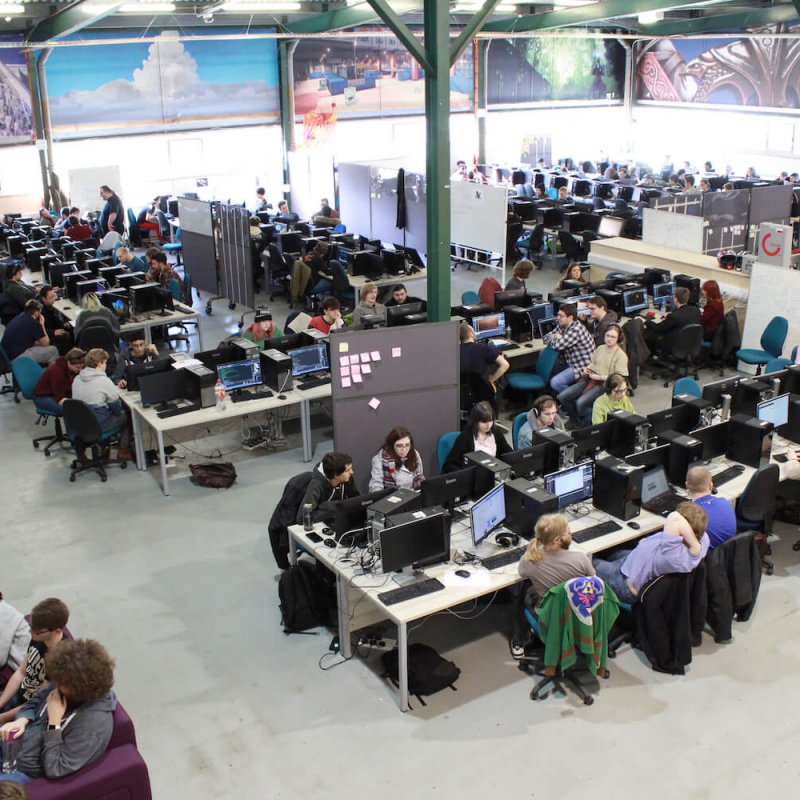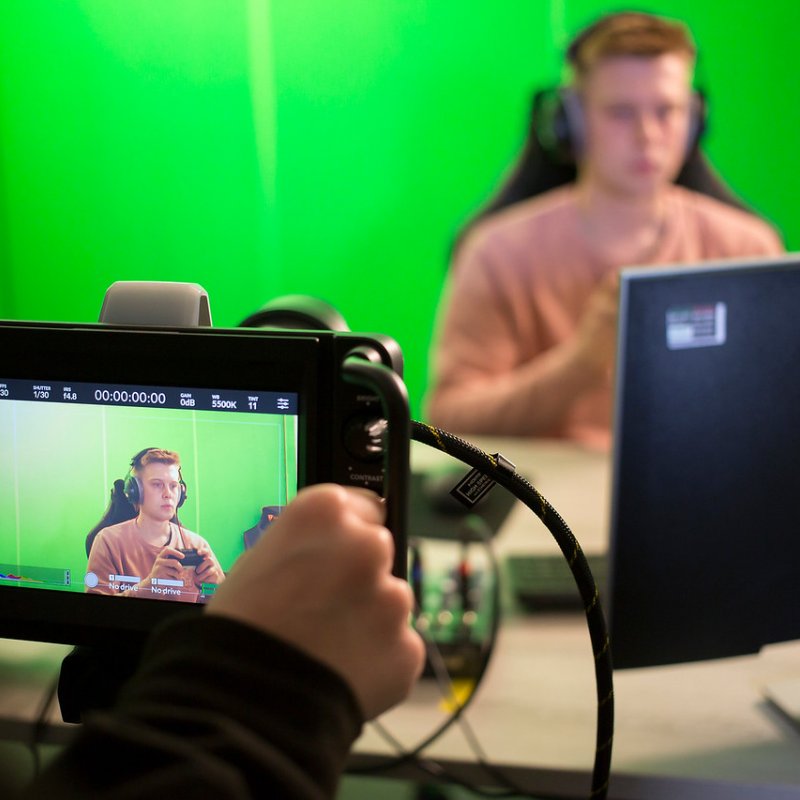


Esports & Livestreaming BA(Hons)
Build a career as a livestreaming and event professional.
Course overview
Currently experiencing explosive growth, the esports and livestreaming industry is made up of professional esports players, shoutcasters, games publishers, broadcast/streaming providers like Twitch and YouTube, global sponsors, technology providers and events specialists.
Join our Esports & Livestreaming BA(Hons) degree, and learn from experts across esports, media communications, business and games. You’ll gain the skills to set up, promote, broadcast and mediate live events such as esports matches. On this Esports & Livestreaming BA(Hons) course, you'll build a working knowledge of different production methods, discover techniques for boosting audience engagement and develop an understanding of brand management and marketing.
Why study this course at Falmouth?
- We’ll equip you with the promotional skills to stand out in a competitive field, along with an understanding of the ethical, professional and cultural concerns facing modern esports and livestreaming
- You’ll be based within Falmouth’s renowned Games Academy, in a professional-standard esports lab equipped with high-end kit
- You’ll gain hands-on experience in preparation for a career as a livestreaming and event professional, collaborating with Falmouth games students to broadcast real matches and experiment with independent content creation
- You’ll learn from experts across our creative courses, including esports, media communications, business and games
- Throughout your degree, you’ll have opportunities to gain experience in a variety of roles within esports and livestreaming, both behind and in front of the camera
Course details
With an emphasis on learning through collaborative experiences, you’ll graduate with the knowledge and skills to set up a professional live streaming network and broadcast and mediate esports matches.
You'll delve into the theories and contexts of esports, develop strategic planning knowhow, learn end-to-end production skills and explore branding, marketing and promotion, as well as gaining an understanding of the financial, legal and ethical considerations of the industry.
Course study options
You can gain your Esports & Livestreaming BA(Hons) degree in three years or choose to add an Integrated Foundation Year and/or professional placement year. Discover the full course details for each study option, below.
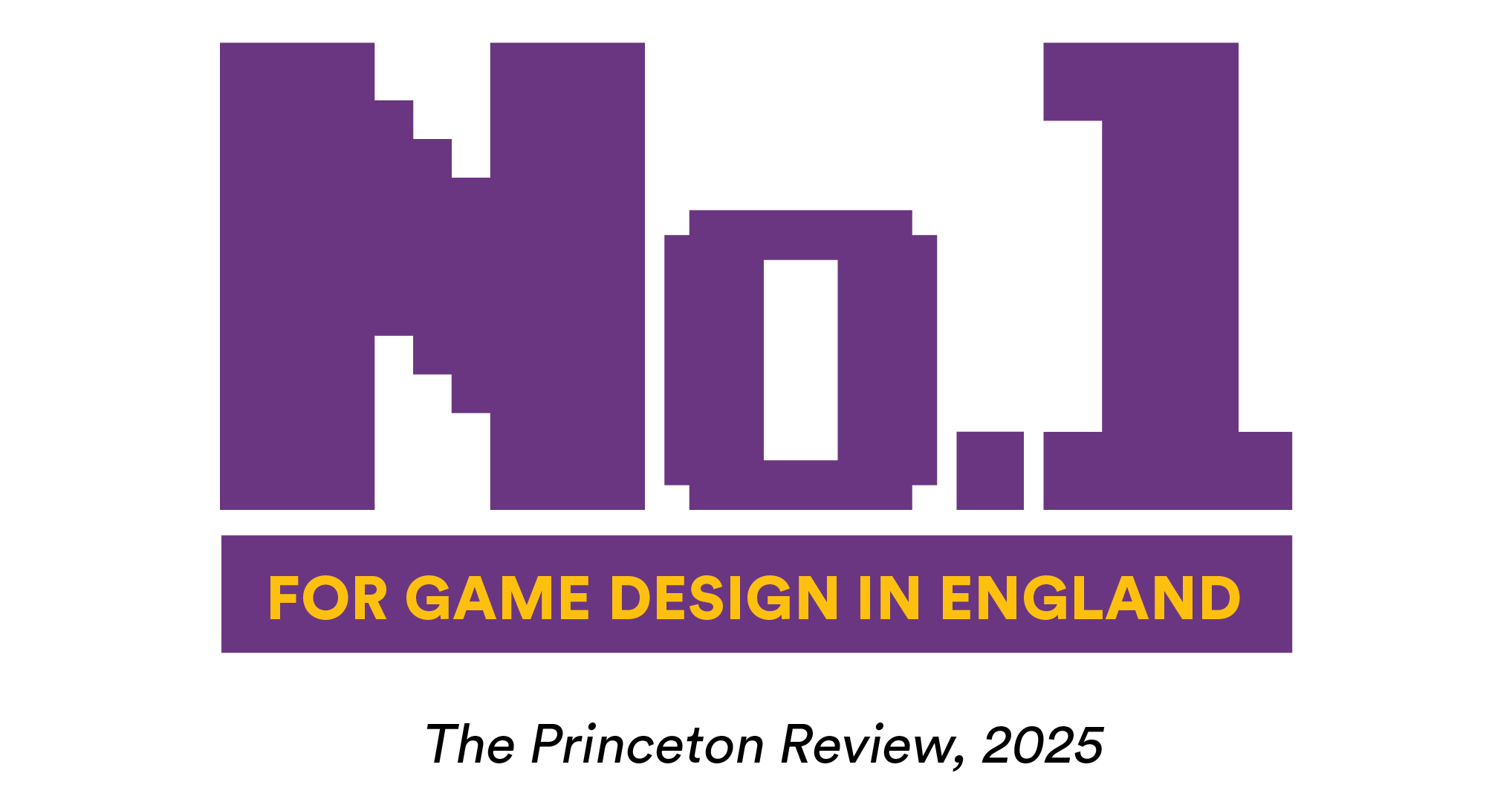
In year one of Esports & Livestreaming BA(Hons), you'll gain a solid practical and theoretical foundation in the field of esports. You'll learn about the basic context in which esports are streamed, gain an understanding of the whole delivery process from start to finish, discover the roles that work together to make a project happen and explore team-working methodologies. You'll also get an introduction to digital media and creative marketing processes.
Modules
Development Foundations
You'll engage with the foundational collaborative steps involved in the development and delivery of digital products and services.
Livestreaming Tools
In this module, you'll develop an understanding of the components and tools that make up a live networked streaming setup designed for online spectatorship.
Digital Creativity
On this module, you will explore digital media formats including text, image and sound. You’ll play, tinker, experiment with and extend digital artefacts, transforming what already exists in one form into another form as a means of appropriation.
You’ll also consider moral and legal questions surrounding digital creativity, such as plagiarism, intellectual property law, licensing rights, representation and media literacy.
Data Fundamentals
You’ll learn to use computer systems to process and analyse data.
Multidisciplinary Teamwork
Collaborating in multi-skilled teams, you’ll deliver a proof-of-concept for a digital product or service.
Esports Production
In this module, you'll explore the components that make up streamed content designed for online spectatorship.
In year two of this Esports & Livestreaming degree, your growing knowledge and skills will be put to the test with practical projects. You'll define and execute a solo esports, livestreaming or content creation project and work in a team to respond to a project brief. You'll consider the game-specific factors that impact spectator experience, encounter the legal, regulatory, financial and ethical considerations for running an esports business and develop an understanding of branding and promotion.
Modules
Individual Esports Project
You'll strike out on your own to explore content creation and media production as part of a solo project. You can focus on esports or digital content creation more generally.
Media Lab
You'll explore the creative opportunities and ethical implications of media technologies and advertising platforms.
Esports Event
Working in a team, you’ll plan and produce an esports event while considering wider questions surrounding audience engagement and effective working practice.
Through this project, you’ll address the challenges of mediating a specific game to a defined audience and what makes for exciting highlights. You’ll also explore how different games naturally affect the form of the broadcast, as well as how the audience engages with both promotional and livestreamed content.
Esports Studies
In this module, you'll explore the historical context, theories and concepts that surround esports and related disciplines, such as sports and visual media.
Social Media Marketing
You'll be introduced to the principles of content and social media marketing, looking at the platforms available and their place in the wider marketing context. Case studies will be used to demonstrate how these platforms can be used to influence and develop product and brand awareness as well as increase brand loyalty and business growth. You'll also learn how to measure growth in these channels.
Immersive and Participatory Performance
More information to follow.
You can choose to take an optional professional placement after your second year on a three-year programme, or after your third year if you’re studying for a degree with an Integrated Foundation Year.
You’ll be responsible for finding your own placement, with support from the Employability team.
Choosing this option will enhance your industry experience and skills while studying.
How you’ll study during your professional placement
You’ll spend time working in a professional context, as part of a business or organisation. This can be in one role, or up to three, and must be for a minimum of 24 weeks.
You’ll develop in-demand workplace skills, deepen your insight into industry and grow your network of contacts, all of which could help you get ahead in your career after graduation.
Throughout this year, you’ll develop a portfolio of work that includes critical self-reflection on what has been learned from the experience. You’ll be required to evidence your experiences, the skills you’ve learned and your professional growth.
The final year of your Esports & Livestreaming degree is all about preparing for industry. You'll gain vital entrepreneurial know-how and finesse your practical skills by doing it for real. Working in a team, you'll deliver a large-scale, long-term esports event management project, which you'll present at the end of year show. To support this practical project, you'll write an extended essay based on a specific game and/or esports research topic.
Teaching is geared around developing your professional practice and portfolio, helping you to build contacts and support your transition to employment, potentially including the creation of your own company.
Modules
Professional Portfolio
With guidance and mentoring, you'll advance and consolidate your knowledge of the enterprise and employment context of your relevant industry through the completion of a professional portfolio.
Future Skills
You'll cultivate your professional journey, developing an understanding of your skills in the context of industry and employment. You'll be equipped with the confidence to articulate your knowledge and abilities, and evidence how you can apply them to real world challenges.
Working on a collaborative or solo project, you'll deliver real results, whether that's a profit on some seed funding, a professional portfolio of work, or a solution to a real-world challenge from industry.
Esports Live Performance
You’ll plan, rehearse and deliver the inaugural broadcast that will kickstart a series of esports broadcasts.
Future of Games
This theory-based module will help you build a greater awareness of the evolving nature of games and esports. You'll deepen your understanding of the cultural, social and political contexts within which games and esports are made, played and perceived.
Major Collaboration
In the final module, you'll develop professional autonomy as you collaborate in multi-skilled teams to produce a market-viable service or product based on your own intellectual property.
Why study an Integrated Foundation Year route?
If you’re taking on a new subject that you haven’t studied in depth before, have been out of education for a while or have a non-standard educational background then an Integrated Foundation Year degree may be the right choice for you. It is a four-year degree with an Integrated Foundation Year to start, which allows you to explore the primary elements of your subject before progressing on to the remaining three years of the BA(Hons) degree.
What you'll learn
If you choose this pathway, you'll study five core modules in your Foundation year. These are all designed to help you explore the foundational elements of your subject. You'll gain relevant technical skills, learn to experiment and take risks, develop an understanding of professional practice, have opportunities to work across disciplines and collaborate with other students on live project briefs.
Modules
Explore
You'll begin your foundation year by working collaboratively with others to explore themes of the future. You'll take risks, experiment through play and be supported to break through barriers.
Technique
You'll take subject-specific workshops and develop essential technical and practical skills in your area of study. You'll also enhance your analytical and organisational abilities.
Apply
You'll work with your peer group to think beyond discipline by addressing a societal or global issue. You'll then showcase your work to your peers and deliver and accompanying evaluation of your process.
Industry
You'll enhance your creative and practical skills in your subject specialism by responding to typical industry briefs, underpinned by focused research and experiments. You'll also gain industry insights through guest lectures and workshops.
Launch
You'll develop your unique identity in your specialism through the production of a self-initiated body of work. Your final project will be the bridge to your next year, fully supported by evaluative reviews and critical analysis of the work you have created.
After the Foundation year, you progress into Year One of the full three-year degree, equipped with a deeper knowledge of your subject, a clear understanding of your strengths, and develop a practical and technical skillset and the confidence to excel in your chosen subject.
If you apply for and enrol onto a degree with an Integrated Foundation Year, you’ll have the option to switch onto a five-year version including a placement year. That means you’ll complete the first three years of your course before completing a placement in industry in your fourth year and returning to Falmouth for the fifth year of your programme.
The Integrated Foundation Year pathway for this course is new for entry year 2023 and subject to validation.
As part of our process of continuous improvement, we routinely review course content to ensure that all our students benefit from a high-quality and rewarding academic experience. As such, there may be some changes made to your course which are not immediately reflected in the content displayed on our website. Any students affected will be informed of any changes made directly.
Facilities
The Games Academy has one of the largest dedicated game development studio spaces of any UK university. Our students have access to spacious, team-focused, professional-standard studios; as well as a dedicated craft room, breakout spaces and a range of industry-standard software and tools.
- Game Development studio space
- Esports studio
- Industry-standard tools and software such as:
- VR Headest (HTC Vive, Value Index)
- Motion Capture Suits
- Unity
- Unreal Engine
- Material Costs estimate:
- High-specification gaming PCs
- Gaming Chairs
- Desks (1400mm)
- PC Monitors (Razr Raptor 27in)
- Playstation 5 Consoles
- Console monitors (LGCX48)
- Network Switch
- Control Surface
- Broadcast PCs (Production, Observation, Diagnostic)
- Streaming camera (PTZOptics)
- Microphone (Sennheiser G4 handheld)
- Lights (Kinoflow Divalight 20)
- Black Magic Studio camera
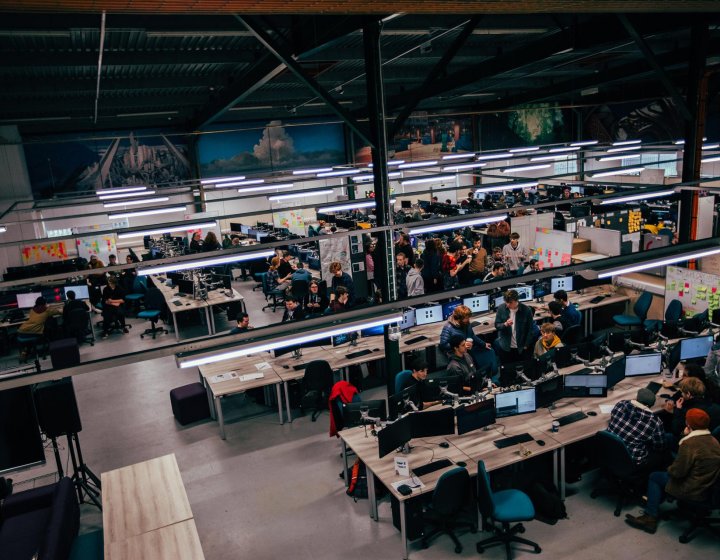
Games Academy Facilities
Our Games Academy offers professional-standard studios, a dedicated craft room, breakout spaces, and...
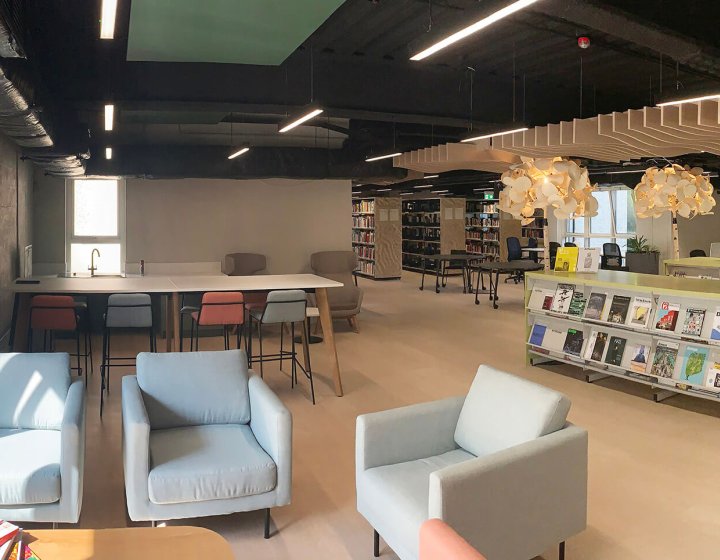
Library Facilities
Offering extensive collections, our two libraries provide a wealth of digital resources, magazines, ...

Sports Centre
Our Sports Centre, on Penryn Campus, includes a spacious gym with up to 90 of the latest, new statio...

Stories from our community
Explore student projects, graduate successes, staff news and industry insights

Game artist Nate Bedford on creating unique characters
14 April 2025
Whether sketching strangers in cafés or dreaming up fantasy worlds, Game Art BA(Hons) alumni Nate B...

Building blockbuster games from Penryn: The Cornishman working on Atomfall
28 March 2025
Ross Everson always knew he wanted to make games — but his journey into making some of the gaming...

Falmouth’s Games Academy rises to 13th in The Princeton Review's global game design rankings
26 March 2025
Falmouth University’s Games Academy has once again been recognised as one of the world’s top ins...

Chris Copeland: Life as a Technical Artist
25 March 2025
Graduate Chris Copeland has embraced change since completing the Game Development: Art course. After...
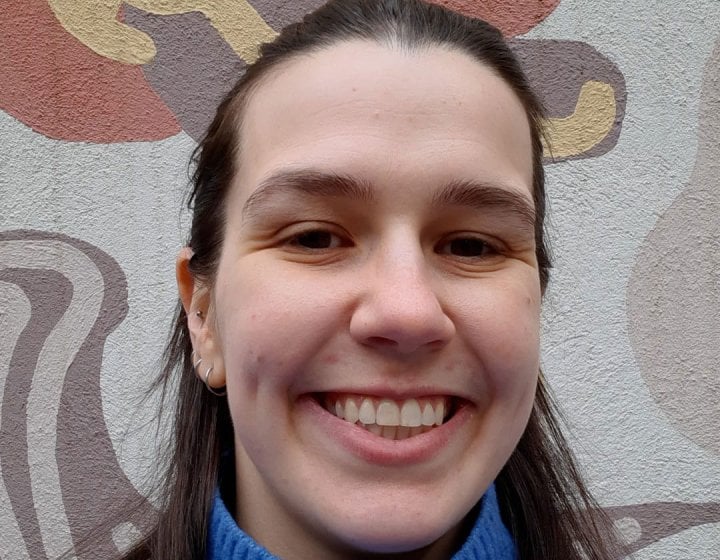
Cyclaport: The UX Project designed to help Brussels’ Cyclists
19 March 2025
After starting her career as an illustrator, Sarah quickly became drawn to the fast-evolving world o...

Illustration graduate redraws future in games industry
14 March 2025
Originally enrolled in Falmouth’s Illustration BA(Hons) course, Thomas soon realised that his pass...

Exploring the Future of Gaming with Ryan Norrington
14 March 2025
We’re excited to welcome Ryan Norrington, Creative Director at Metavision, as a guest speaker for ...

“Making games isn’t an impenetrable field for a select few,” says lecturer Adam Clewes-Boyne
04 March 2025
Indie Game Development MA (Online) lecturer Adam Clewes-Boyne went from not knowing that a career in...

“You won’t be shy of things to do as a UX designer” says lecturer Jason Haritou
04 March 2025
User Experience Design MA (Online) lecturer Jason Haritou has many strings to his bow. Beginning his...
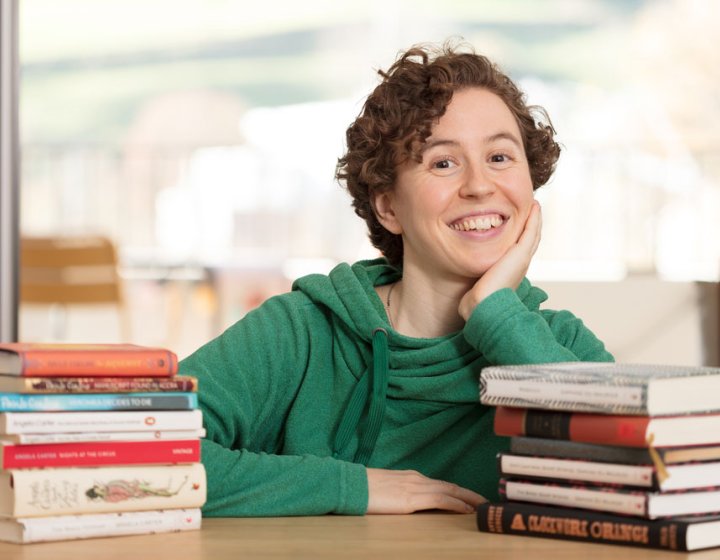
Hannah Cattanach: From architect to UX Designer
23 January 2025
It was late 2022 when Hannah decided to trade in her career as an architect to embark on a new chall...

Falmouth Robotics students build unique panto prop
20 January 2025
Robotics BA(Hons) students Amy While and Maya Rogers recently worked on a custom conveyor belt for u...

Scratching the creative itch: lecturer Joe Kennett’s path in indie games
20 December 2024
It’s been a busy year for Joe Kennett. 2024 has seen him take on a new role as lecturer on Falmout...

Work by Nathan Bedford
A guide to Worldbuilding
31 October 2024
Worldbuilding shapes the sights, sounds, and experiences that draw audiences into a new universe. Bu...

Three scary releases from the Games Academy this Halloween
24 October 2024
At Falmouth, Halloween isn’t just about scary movies and pumpkin carving; it’s also about sampli...

"Failure is a good thing," says Indie Game Development MA (Online) graduate
21 October 2024
Since starting his undergraduate degree at Falmouth in 2019, and through to completing his online In...

Falmouth Alumni Studio 316 Unveil New Game: Post Apocalypse Courier Service
11 October 2024
Studio 316, a game development studio founded by graduates of the Games Academy via Launchpad, has a...

Falmouth Alumni releases new adventure game on Steam
04 October 2024
Three former Games Academy graduates have released their first game, Leximan, from their game studio...
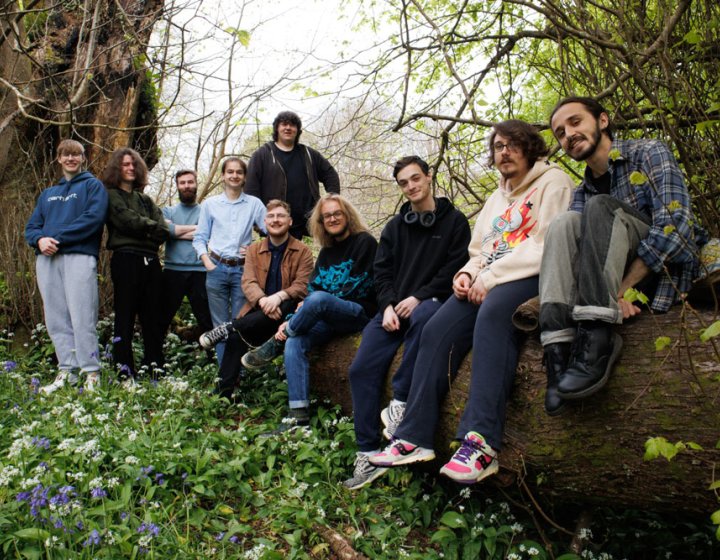
Students get their game featured by The Rookies
08 August 2024
Eleven Games Academy graduates have gained recognition for their new game, Petal, from the industry ...
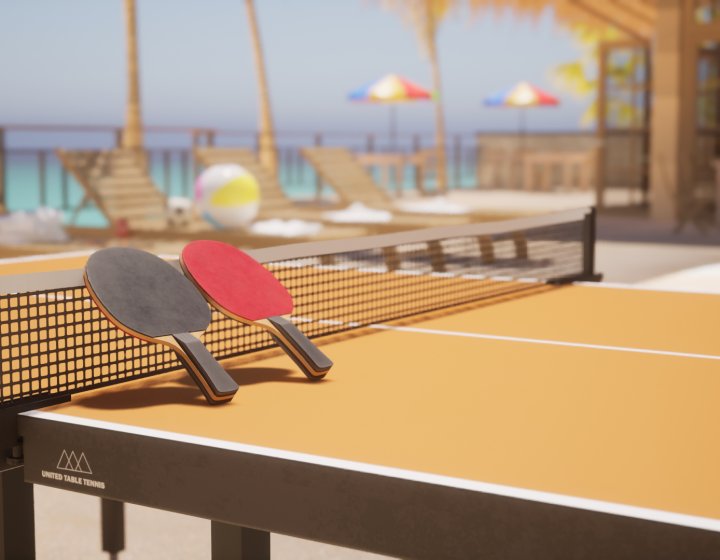
Games Academy alumni release their latest game on Nintendo Switch
07 June 2024
Studio 316, a Cornwall-based games studio which comprises of five former Falmouth University Games A...

Dr Tony Pellicone: my top five favourite games
10 April 2024
One of the simplest joys of loving games is talking about your favourite games – the ones that sta...


How you'll learn & be assessed
The delivery of esports events requires a broad-ranging skillset. While you'll predominantly learn from staff within the Games Academy, you'll also tap into the expertise of lecturers from the wider University. You'll learn through lectures, seminars and practical workshops in an esports lab – getting hands-on experience with streaming live matches.
At Falmouth, we use a 'digitally enhanced learning & teaching' approach. Your experience will always be predominantly in-person, including seminars, tutorials and studio teaching, with some, more targeted elements, being online either live (synchronous) or pre-recorded (asynchronous). You can read more here.
100% of your assessment will be coursework.
Assessment methods
You'll be assessed through a variety of methods, including:
- Short-form theory essays
- Business cases
- Group and solo practical projects
Foundation year assessments are 100% coursework based.
Staff
You'll learn from staff with expertise across a range of disciplines including business, audio visual equipment management, computer science, games studies, as well as practical industry experience relating to esports. Our staff also have strong connections to sports organisations and production companies, such as the British Esports Association, Supercell Esports, Codices.io, as well as international esports research and education institutions.
Some members of staff only teach on specific modules, and your course might not feature every staff member who teaches on the course.

Mark L'Estrange
Senior Lecturer, Esports & Livestreaming BA(Hons)
Mark's history in Esports goes back to 1999 when he joined a Florida Counterstrike Team while living...

Dr William H Huber
Associate Professor of Game Studies
Dr William Huber studies videogames, new media and digital/ludic culture. Currently Associate Profes...

Got a question about this degree? Ask our course team now.
Chat to usCareers
The following companies and roles could be potential destinations for graduates:
- Esports production companies such as ESL, PGL Esports, Esports Engine, or Dreamhack
- Esports white label companies such as those that help set up events like BlizzCon
- Community management positions at developer-publishers such as Activision Blizzard, Supercell, or Riot games
- Adjacent live streaming opportunities working for non-esports broadcasters and content creation hubs
- Streaming platforms such as Twitch and YouTube
Specific potential roles include:
- Live streaming producer
- Event manager
- Technical/camera director
- AV/lighting technician
- Graphics director
- Replay operator/in-game observer
- Floor manager
- Technical manager
- Esport strategy analyst
- Esport community manager
- Shoutcaster/host
- Independent live streamer/content creator
- PR/marketing agent
- Esports product manager
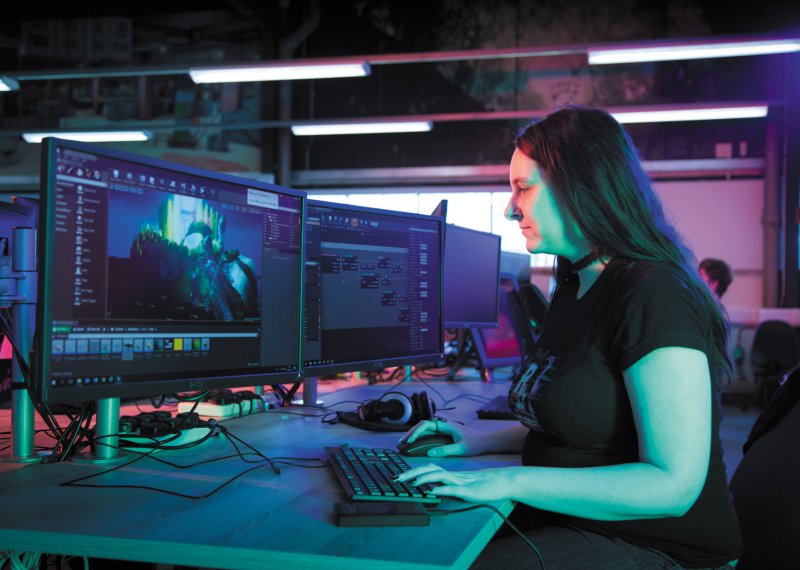
Gaming is the fastest-growing form of entertainment globally, with over 2.5 billion video gamers around the world.
How to apply
Ready to apply for 2025?
You can apply for our undergraduate degrees via UCAS. You'll need our university UCAS code (F33) as well as your course code (which you'll find on your course page) for your application.
| Course route | UCAS code |
|---|---|
| Esports & Livestreaming BA(Hons) three year degree | N881 |
| Esports & Livestreaming BA(Hons) with Integrated Foundation Year | FY60 |
| Esports & Livestreaming BA(Hons) with professional placement | PY57 |

Application advice & interview information
Go to ToolkitFor starting your studies in 2025
UK applications: 29 January 2025 (for equal consideration)
Applications after the 29 January will be considered on a first-come, first-served as long as there are places available. Apply for this course now.
International fee payers
International fee payers can apply throughout the year. But we recommend applying as early as possible, to make time for visa and travel arrangements.
We consider all applications on their own individual merit and potential. We invite all applicants to an interview day or audition to give them the opportunity to demonstrate this along with what inspires and motivates them in their field. Applicants will also be able to show their portfolio or give a performance depending on the course. We welcome applications from all subject backgrounds, whether you’ve specialised in STEM, the arts or humanities.
Course routes & entry requirements
BA/BSc(Hons) three year degree: 104 – 120 UCAS Tariff points
BA/BSc(Hons) four year degree with professional placement: 104 – 120 UCAS Tariff points
BA/BSc(Hons) four year degree with Integrated Foundation Year: 80 – 120 UCAS Tariff points
Check the title of your course to see if it's a BA or BSc award. UCAS Tariff points will primarily be from Level 3 qualifications such as but not limited to A-levels, T Levels, a BTEC/UAL Extended Diploma or a Foundation Diploma.
For applicants whose first language is English we require you to have or be working towards GCSE English Language Grade 4 (C), or equivalent.
If English is not your first language you will need to meet the same standard which is equivalent to the IELTS Academic 6.0 overall score, with at least 5.5 in Reading, Writing, Speaking and Listening. We accept a range of in country equivalencies and approved tests.
If you need a student visa to study in the UK, you may need to take a recognised language test. You can read our English Language Requirements for more information.
Fees, costs & funding
Tuition fees
| Annual tuition fee | Student |
|---|---|
| £9,535 per year | Full-time UK |
| £17,950 per year | Full-time EU/international |
| £1,905 per professional placement year | Full-time UK and EU/international |
| £9,535 per Integrated Foundation Year | Full-time UK |
| £17,950 per Integrated Foundation Year | Full-time EU/international |
| Annual tuition fee | Student |
|---|---|
| £9,250 per year | Full-time UK |
| £17,950 per year | Full-time EU/international |
| £1,850 per professional placement year | Full-time UK and EU/international |
| £9,250 per Integrated Foundation Year | Full-time UK |
| £17,950 per Integrated Foundation Year | Full-time EU/international |
Tuition fees for September 2026 will be confirmed in summer 2025.
Tuition fees are set annually and are subject to review each year. The University may therefore raise tuition fees in the second or subsequent years of a course, in line with inflation and/or the maximum permitted by law or Government policy. Students will be notified of any changes as soon as possible.
The figures above don't include accommodation and living costs
Typical course costs
One-off costs for the duration of the course
£1500 - Personal computer
A desktop and/or laptop (please see your Welcome Letter for specifications). A streaming setup including a camera, microphone, and high-speed Internet connection are beneficial but not mandatory.
£30- £150 - Headset with microphone
£25-£100 - Webcam
£70 - Optional reading
If you need to bring equipment or materials with you, these will be outlined in your Welcome Letter.
Additional typical course costs for Integrated Foundation Year pathway
- £250 for materials
- A laptop/desktop computer
- Adobe Creative Suite
To engage in the digital learning activity, although you will be able to access IT suites on campus, you will benefit from a laptop to access the platforms and tools we use. Depending on your subject, you may need a specific type of computer. If you're unsure about what you might need, please contact our course advisors.
Funding
For information about funding available, please visit our student funding pages.
Ask a student
What better way to find out about life at Falmouth University than by asking our current students?
From course details and academic support, to the social scene and settling in, our students are ready and available to answer any questions you might have. Simply set up your account, send them a question and they'll get back to you within 24 hours.
Similar courses
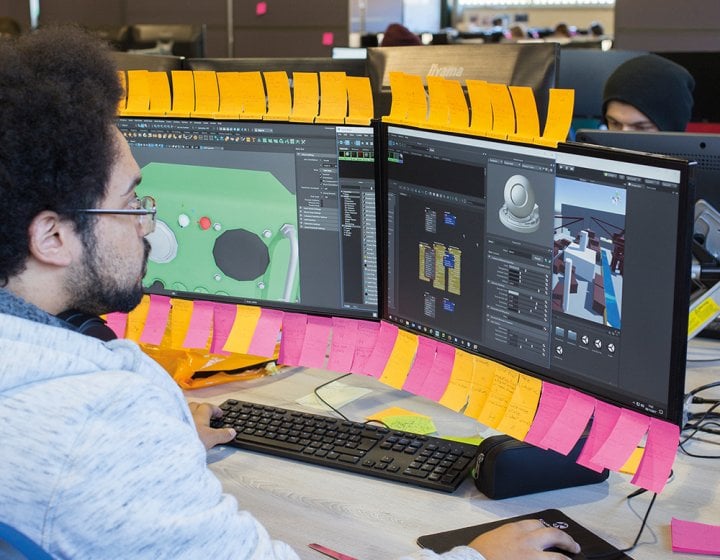
Game Animation BA(Hons)
Gain experience of working to a real-time animation pipeline and graduate with a rich portfolio of w...
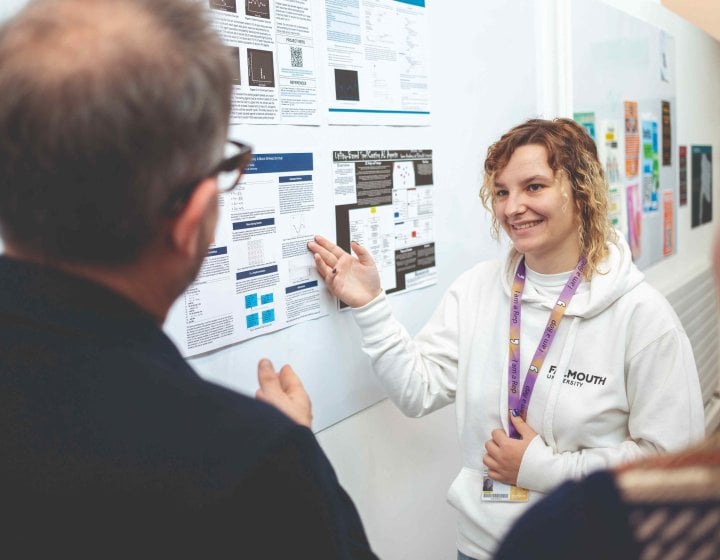
Computer Science BSc(Hons)
New immersive realities, data-rich interactions, automations and ever-more ubiquitous systems are sh...
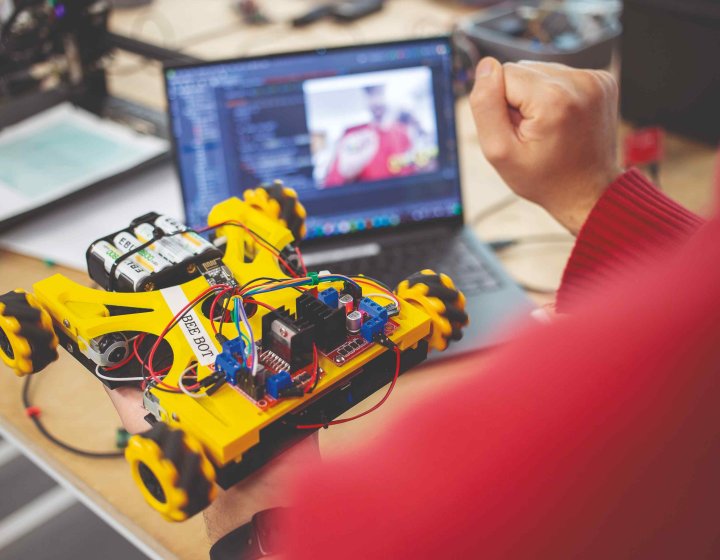
Robotics BSc(Hons)
Explore the world of artificial intelligence and create interactive robots that respond to the chall...
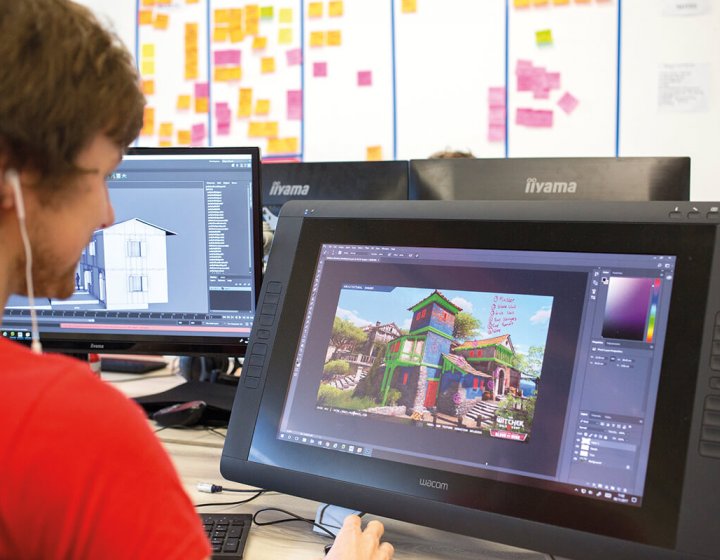
Game Development BA(Hons)
Join a community of people who have a passion for games. From day one, you’ll work as you would wi...

Game Art BA(Hons)
Work in multi-skilled collaborative teams and graduate as a confident, industry-ready game artist. ...
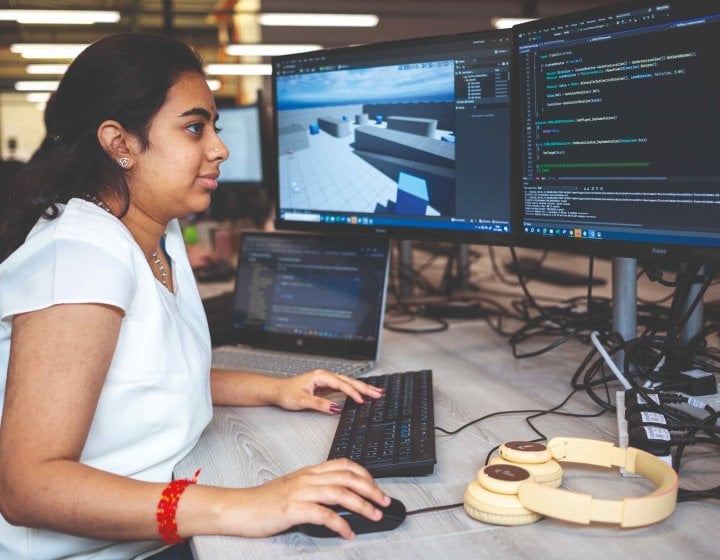
Computing for Games BSc(Hons)
Learn how to shape the games of the future by studying game development through the lens of computer...
Open Days and events
From visiting campus to online application advice, get all the information you need about joining our creative community.
Find an event









